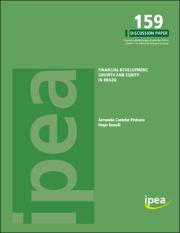Please use this identifier to cite or link to this item:
https://repositorio.ipea.gov.br/handle/11058/4936Full metadata record
| DC Field | Value | Language |
|---|---|---|
| dc.contributor.author | Pinheiro, Armando Castelar | - |
| dc.contributor.author | Bonelli, Regis | - |
| dc.coverage.spatial | Brasil | pt_BR |
| dc.coverage.spatial | América Latina | pt_BR |
| dc.date.accessioned | 2015-10-28T15:10:34Z | - |
| dc.date.available | 2015-10-28T15:10:34Z | - |
| dc.date.issued | 2015-01 | - |
| dc.identifier.uri | http://repositorio.ipea.gov.br/handle/11058/4936 | - |
| dc.description.abstract | Os mercados financeiros são um importante instrumento para acelerar o crescimento e a produtividade devido ao seu papel na mobilização de poupanças, seleção e monitoramento de projetos de investimento, diversificação de riscos, e pelo fato de permitirem que o investimento e a produção sejam efetuados segundo a escala e duração mais produtivos. O desenvolvimento desses mercados é uma das áreas em que as reformas estruturais mais avançaram na América Latina desde o começo das reformas nos anos 1990, mas não no Brasil. O trabalho em epígrafe estuda as inter-relações entre desenvolvimento financeiro, crescimento econômico e equidade utilizando a experiência brasileira recente como exemplo, mas com a finalidade de contribuir para uma discussão mais ampla acerca do papel dos mercados financeiros na promoção do desenvolvimento econômico na América Latina. A análise avalia: a) os aspectos comuns entre o crescimento do Brasil e da América Latina no que diz respeito ao ritmo e às fontes de crescimento desde os anos 1990; b) mudanças na intermediação financeira na região, enfatizando o papel do setor público na absorção de poupança privada; c) as interfaces entre crescimento e desenvolvimento do setor financeiro; d) o tema do acesso aos serviços financeiros, uma questão fundamental na vinculação entre desenvolvimento financeiro e equidade; e e) as limitações que a ausência de aprofundamento financeiro trazem à inclusão social, a partir da experiência do Brasil. | pt_BR |
| dc.language.iso | en-US | pt_BR |
| dc.publisher | Instituto de Pesquisa Econômica Aplicada (Ipea) | pt_BR |
| dc.title | Financial development, growth and equity in Brazil | pt_BR |
| dc.title.alternative | Discussion Paper 159 : Financial development, growth and equity in Brazil | pt_BR |
| dc.title.alternative | Desenvolvimento financeiro, crescimento e equidade no Brasil | pt_BR |
| dc.type | Discussion Paper | pt_BR |
| dc.rights.holder | Instituto de Pesquisa Econômica Aplicada (Ipea) | pt_BR |
| dc.source.urlsource | http://www.ipea.gov.br | pt_BR |
| dc.location.country | BR | pt_BR |
| dc.description.physical | 33 p. : il. | pt_BR |
| dc.rights.license | Reproduction of this text and the data it contains is allowed as long as the source is cited. Reproductions for commercial purposes are prohibited. | pt_BR |
| dc.subject.keyword | Mercados financeiros | pt_BR |
| dc.subject.keyword | Desenvolvimento financeiro | pt_BR |
| dc.subject.keyword | Crescimento econômico | pt_BR |
| dc.subject.keyword | Equidade | pt_BR |
| dc.relation.references | http://repositorio.ipea.gov.br/handle/11058/2970 | pt_BR |
| ipea.description.objective | Estudar as inter-relações entre desenvolvimento financeiro, crescimento econômico e equidade utilizando a experiência brasileira recente como exemplo, mas com a finalidade de contribuir para uma discussão mais ampla acerca do papel dos mercados financeiros na promoção do desenvolvimento econômico na América Latina. | pt_BR |
| ipea.description.additionalinformation | Série monográfica: Discussion Paper ; 159 | pt_BR |
| ipea.description.additionalinformation | Possui referências bibliográficas | pt_BR |
| ipea.description.additionalinformation | Série: Originally published by Ipea in September 2005 as number 1118 of the series Texto para Discussão | pt_BR |
| ipea.access.type | Acesso Aberto | pt_BR |
| ipea.rights.type | Licença Comum | pt_BR |
| ipea.englishdescription.abstract | Financial markets help to foster growth and productivity through their role in mobilizing savings to finance investment and production, selecting and monitoring investment projects, diversifying risks, and allowing investment and production to be carried out in the most productive scale and time frame. This paper examines the links between financial development, growth and equity. The focus is on the Brazilian case, but we also aim at contributing to a broader discussion on the role of financial markets in fostering economic development in Latin America. The analysis discusses: a) Brazil’s recent growth record, which resembles Latin America’s average regarding pace and sources of growth; b) recent changes in financial intermediation in the region, stressing the role of the public sector in absorbing private savings; c) the interface between growth and finance; d) the issue of access to financial services; and e) the impediments to financial deepening and inclusion drawn from the Brazilian experience. Among its conclusions we highlight the relatively small contribution the Brazilian financial system has had towards promoting growth and equity in the following sequence: a) the incomplete macroeconomic adjustment of the economy, which lead to high interest rates, market volatility, and a preference of savers for liquid, short-term financial investments; b) the high tax burden and the associated high degree of informality and fiddling with company accounts, which lower the quality of the information disclosed to financial institutions and capital markets; c) the central role of the state in mobilizing and allocating savings, largely an inheritance of the pre-1990s development model, which dampens the impact of financial intermediation on capital productivity; and d ) the low protection of minority shareholders and especially creditors against expropriation by the state and private parties create a highly uncertain and risky environment that raises the cost of capital, discourages financial intermediation and raises the preference for short-term and liquid financial assets. | pt_BR |
| ipea.researchfields | N/A | pt_BR |
| ipea.classification | Economia. Desenvolvimento Econômico | pt_BR |
| ipea.classification | Sistema Monetário. Finanças. Bancos | pt_BR |
| Appears in Collections: | Sistema Monetário. Finanças. Bancos: Livros | |
Files in This Item:
| File | Description | Size | Format | |
|---|---|---|---|---|
| DiscussionPaper_159.pdf | 359.88 kB | Adobe PDF |  View/Open |
Items in DSpace are protected by copyright, with all rights reserved, unless otherwise indicated.

